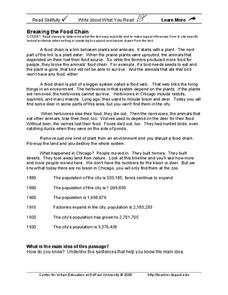TryEngineering
Circuits and Boolean Expressions
Teach basic logic using Boolean operators. Young computer scientists learn about the operators NOT, AND, and OR, and how they can be expressed using Boolean notation, logic gates, or truth tables. Along the way, they learn about half...
World Intellectual Property Organization
Learn from the Past, Create the Future: Inventions and Patents
3D printers, selfie sticks, smart watches. GPS, self-driving cars, YouTube. Imagine life without inventions. Believe it or not, these items were all invented in the last 10 years. Inventions, and the inventors responsible for them, are...
DePaul University
Breaking the Food Chain
Throughout history, the growth of big cities has resulted in the destruction of ecosystems. In the case of Chicago, IL, a grassland that was once home to bison, deer, wolves, and foxes quickly became a booming city of over three million...
PBS
The Water Cycle: Ways of Watersheds | UNC-TV
Explore water on Earth without getting wet using a short animated activity. Scientists learn how water interacts with the land, the importance of watersheds, and relevant vocabulary as they watch an informative and engaging video....
Smithsonian Institution
Weather Widget
What's so difficult about predicting the weather? Scholars work collaboratively to build a device that models how meteorologists use computers to forecast weather. Team members collect and interpret data while working together to...
Smithsonian Institution
Trait Tracker
Help mice beat the odds with an exciting activity about traits. Biologists discover the role of diet and other factors on animal traits by participating in a simulation activity. Teams collect and evaluate data to understand how certain...
UAF Geophysical Institute
System Interactions: The Lorax and the Truffula Tree
If the Lorax were to write a letter, what would he write? Introduce your class to systems and feedback loops through the whimsical stylings of Dr. Seuss. Learners take on the Lorax's point of view to write a letter, among other activities.
K12 Reader
What Is Gravity
This cross-curricular reading comprehension learning exercise asks kids to read a short passage about gravity and then to answer questions about the article.
K12 Reader
Microscopes Magnify Things
After examining a short article about light microscopes, readers record their responses to a series of comprehension questions based on the text.
K12 Reader
Summarize It!
A key reading comprehension skill is the ability to summarize. Here's a worksheet that not only explains how to summarize, but also explains why summarizing is important.
Boys Town
More Tools for Teaching Social Skills in School
Put an end to wasted instructional time with this lesson on responsibility and preparedness. After completing this series of activities young scholars will learn the importance of these social skills not only in the classroom, but at...
Music Publishers Association of the United States
I Made It. I Own It. Please Don't Steal It.
Explore the world of copyright law with a variety of activities to instill the importance of respecting creative property. Scholars watch an animated tale then take part in a grand conversation detailing the video's main idea, details,...
K12 Reader
Using a Timeline
Introduce you primary graders to timelines with a instructional activity that not only explains what this convenient tool is and how it can be used, but also describes how to construct one.
K12 Reader
Limited Resources
The difference between renewable and non-renewable resources is the focus of a short reading comprehension worksheet that asks kids to respond to a series of questions based on the provided passage.
K12 Reader
Using Land in Different Ways
After reading about rural, urban, and suburban land use, readers respond to a series of comprehension questions using evidence from the provided passage.
K12 Reader
The Rock Cycle
This cross-curricular reading comprehension worksheet asks kids to read a passage of the rock cycle and then to use information in the article to respond to a series of questions.
K12 Reader
Solids, Liquids, & Gases
Solids, liquid, and gas, the three states of matter, are the subject of a cross-curricular reading comprehension exercise that asks kids to first read an article about these forms, and then to respond to a series of questions based on...
K12 Reader
The Scientific Method
The scientific method is the focus of a reading comprehension exercise that provides readers with a short description of the steps, and then asks them to respond to a series of questions based on the article.
National Security Agency
Awesome Area - Geometry and Measurement
Break out those math manipulatives, it's time to teach about area! Capturing the engagement of young mathematicians, this three-lesson series supports children with learning how to measure the area of squares, rectangles, and other...
K12 Reader
Food Is Our Fuel
After studying a short article about how living things fuel their growth, readers respond to a series of comprehension questions based on the article.
Other popular searches
- Earth Science
- Physical Science
- Life Science
- Science Project
- Science Space
- Environment Science
- History of Science
- Environmental Science
- Pe Science
- Family and Consumer Science
- Consumer Science
- Social Science





















